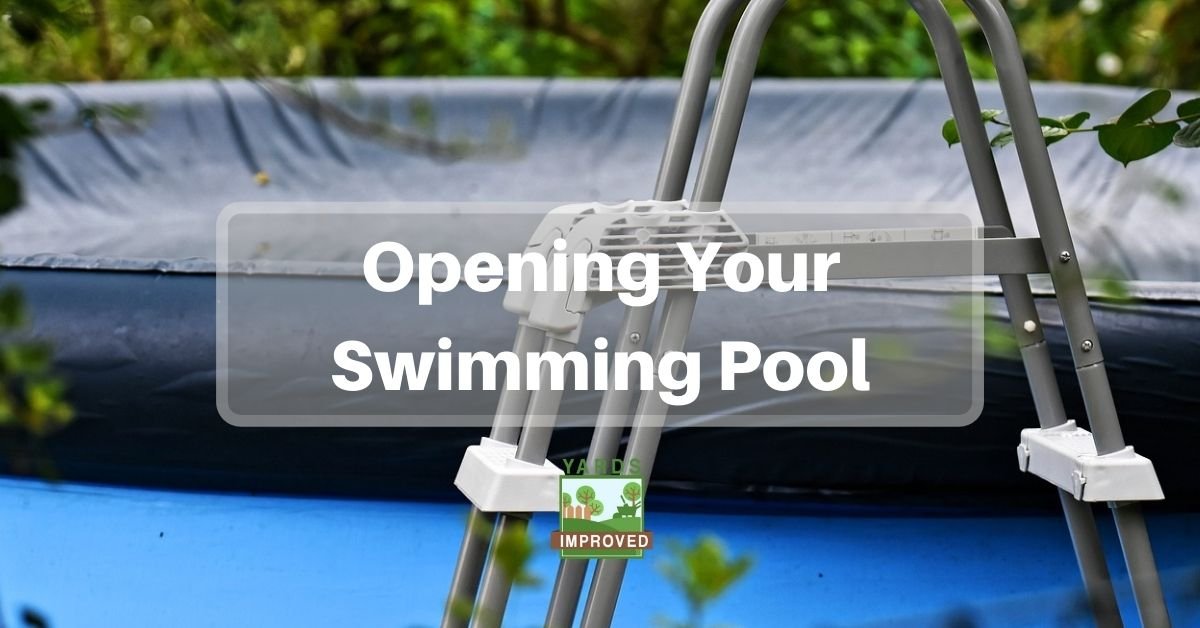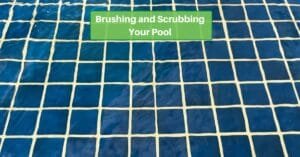As the weather warms up, thoughts naturally turn to the moment we can open our swimming pool! We eagerly look forward to the moment when it will be warm enough to hop in and enjoy a refreshing dip. Of course, that means we have to put some work into getting the pool ready. So let’s go over the steps to follow when it’s time to open your pool!
What You’ll Need To Get Your Pool Open
Of course, there’s more to opening your pool than just removing the cover and filling it with water. Let’s start by looking at what you’ll need to get the job done.
First, safety is important. After all, you want to be able to enjoy the summer! Most pools use chlorine. Whether you use that or some other chemical to help keep your water clean, you should use safety glasses and chemical-resistant gloves when handling them.
You might find our guide to spring yard cleanup useful, too!
You’ll also need supplies of various chemicals to get your water to the proper chemical balance. You may not need all of these, but you’ll likely need several.
- Chlorine (or a substitute)
- Algaecide
- Water clarifier
- pH increaser or decreaser
- Calcium hardness increaser
- Alkalinity increaser
- Metal sequestrant
There are also some important tools to have ready to put to use:
- Skimmer net (or a soft broom)
- Cover pump
- Cover cleaner or a mild car wash detergent
- Water test kit
- Start-up chemical kit
- Pool gasket lubricant
- Thread seal tape
- Telescoping skimmer
- Pool brush
- Garden Hose
- Pool Shock
Find out more about these important pool tools and supplies!
Steps to Opening Your Pool
Once you have your materials together, it’s time to get to work. Taking the tasks step-by-step will help it go more smoothly.
Get this far, but don’t actually have a pool yet? Check our guide to choosing between above-ground and in-ground pools.
Remove debris and water from the pool cover
While your pool was closed, it’s likely that a lot of debris and water have accumulated atop the cover. Use a skimmer net or a broom to remove the debris first. After that, pump off the water that’s sitting on it.
Remove and clean the pool cover
Once you’ve gotten rid of all that accumulated mess, it’s time to take the cover itself off. This is easiest if you have some help, so try to grab a family member or friend who can help with the task.
Use pool cover detergent or a car wash detergent to thoroughly wash the cover, then rinse it off. Allow it to dry completely, then fold it up and store it. But be sure it dries well – otherwise mold will grow on it!
Learn more about pool covers for above-ground pools
Start your filter system
Getting your circulation and filtration system up and running is the next phase of opening your pool. Be sure to inspect the system carefully before turning it on.
The black O-rings that form seals where your pipes and drain plugs attach may dry out over time. If they are cracked or feel rigid, replace them. Apply pool gasket lubricant to keep them in optimal condition.
Connect all your equipment. The exact setup will vary depending on your specific pump and filter.
If you used antifreeze for the winter, run the pump in “waste” mode to drain it completely. Do not run the pump or filter in regular mode yet, since the water level is too low in the pool!
Be sure to remove any winterizing plugs that were inserted in your outflow valves.
Add your ladder and other accessories
You can now replace your pool ladder and any other accessories that go inside your pool. Be sure they are attached firmly in their respective positions.
Fill the pool
You may have lowered the water level for winter. Even if you didn’t, some water will have evaporated. Use your hose to fill the pool up to its optimal level.
Once the pool is full, you can safely open the return valves on the pump system.
Turn on the pump and filter
You can now reactivate your equipment. This will allow all the water to mix and the chemical composition to stabilize across all the water, making it easier to properly treat it.
Test and treat your water
Once your water has circulated, it’s time to test and treat it as necessary.

You can follow our guide to pool water testing. Preferably, use a kit that includes tests for metals like copper. Minimally, your kit should test for pH, calcium hardness, and alkalinity. If you’re not comfortable testing the water yourself, you can take a sample to a local pool supply store. We also suggest doing so occasionally, even if you do your own testing, just to double-check your results.
Treat your water to get the appropriate levels (see our guide, linked above).
Clean the pool
With your pump running, it will be easier to clean the pool.
Use a skimmer to clean out leave or other debris. Use a pool brush to scrub down the walls and accessories. Finally, the pool vacuum will suck up anything that’s sunk to the bottom.
Shock the water
A chlorine shock will get rid of harmful bacteria that’s been growing in the water. While you may have to shock the pool during the season, it’s especially important now as you open the pool.
Be sure to use goggles and gloves, since this is a strong chemical and could damage your eyes and skin. Only work with the shock in an area with good ventilation, too. Be sure to observe all safety precautions on the package.
Let it run
Once you’ve followed all these steps, leave your filter and pump running for at least 24 hours. This will allow the water to circulate fully and for all the chemicals to mix appropriately. It will also remove any particles that were stirred up while you were cleaning.
We recommend leaving the filter running all the time during the swimming season, although we know that’s not always possible.
Conclusion
Nothing beats being able to slip into the pool once the warm weather sets in. Getting your pool ready for the season does take a bit of work, but it’s all worth it! Taking the time to open your pool properly will help you enjoy it more all summer long.









